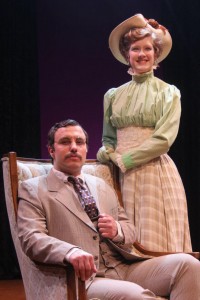Filichia Features: Ready for Teddy & Alice?
Filichia Features: Ready for Teddy & Alice?
 One doesn’t get that many opportunities to see Teddy & Alice, the 1987 Broadway musical. So when Shadow Lawn Stage in West Long Branch, New Jersey announced it was doing the little-known show, I was there.
One doesn’t get that many opportunities to see Teddy & Alice, the 1987 Broadway musical. So when Shadow Lawn Stage in West Long Branch, New Jersey announced it was doing the little-known show, I was there.
It starts the same type of drumroll overture that starts 1776. But this is not a musical about the Founding Fathers who became presidents. Instead, it deals with a president – one Theodore Roosevelt (1858-1919) -- who found himself the father of a headstrong daughter: Alice Roosevelt (1884-1980), whom he had to raise after his wife died two days after giving birth to the lass.
Although most musicals that have an ampersand in their title deal with romantic couples – Nick & Nora, Mack & Mabel – here’s one about a father and daughter. But considering the strife and scrapes they endured, they’d never be confused with Annie and Oliver Warbucks.
Bookwriter Jerome Alden certainly knew his way around his subjects. He had already written Bully! a one-person play about the nation’s 26th chief executive that had been produced on Broadway in 1977. So in Teddy & Alice, he included the issues that were facing the first President Roosevelt: the Panama Canal, national parks and labor strikes.
Alden certainly included one surefire laugh line during a political meeting. When Teddy decides to take a radical action, one of his advisors cautiously says, “Should you consult Congress?” – to which Teddy drones, “No. I want to get this done.”
And then there’s Alice. Long before a recent president had difficulties with his daughters, Alice was disgracing her father at every turn. Of course, some of those scandals won’t strike contemporary audiences as so bad. The first song she sings in the show is in ragtime – which, when you think of it, was the acid rock and heavy metal of her day. And while every young miss was expected to attend a fancy ball in virginal white, Alice shocked everyone by wearing light blue.
John T. Lynes and Sydney Turner as President Teddy Roosevelt and his daughter Alice in the musical “Teddy & Alice” at Shadow Lawn Stage. Photo Credit: Courtesy of 7 Angels Theatre
Because she was the president’s daughter and under the eye of an even-then watchful media, that blue dress caught on. Hence, the expression “Alice Blue Gown,” which later became a show song in its own right. As Teddy says, “Alice never does anything naughty in private – only in public.”
At the ball, Alice does a dance in which she lifts her dress high enough to show her … ankle. She knows she’s the trend-setter, and Teddy and his second wife Edith soon join in to legitimize the dance as acceptable. The result? Alice winds up giving everyone a better time than they would have without her.
Alice smoked, too. In those days, smoking for women was considered as scandalous as it would be today if a woman lit up a Lucky in a library. She’s so outrageous that you might even be tempted to interpolate Donna Summer’s “Hot Stuff” into the score.
Alden smartly humanized the president, too, having a scene where he walks around his bedroom before he puts on his pants. There’s also a scene where Alice is out on a date and is long past her curfew. We see Teddy waiting around for the girl, upstairs in his bedroom. The locale may be The White House, but the situation will resonate with many parents in the audience who have played the same scene in their less lofty homes.
These were the days when a woman was supposed to have her name in the newspaper exactly three times in her life: when she was born, when she married and when she died. Alice had already exceeded that number, and did it without benefit of marriage.
Her take on the institution? “Marriage! Great Scott! They’ll have to drag me down the aisle!”
Ah, but the bigger they talk, the harder they fall. Alice does fall in love with Nicholas Longworth (1869-1931), a Republican representative from Ohio. Teddy Roosevelt was a Republican, too, so you’d think the two would get along.
There’d be a lot less drama in the show if they did. Teddy & Alice shows that the president and Longworth rarely see eye to eye on how to fix the nation’s ills. “He doesn’t have the right stuff,” Teddy tells Alice. She rebuts with “Nick comes from one of the oldest and most distinguished families in Ohio.” (In fact, he was actually Nicholas Longworth IV, if you please.)
Ask any young man how he feels when he first meets his new girlfriend’s father. But imagine if that girlfriend’s father is no less than the President of the United States? Nicholas Longworth gets points for just showing up at the White House.
That’s exacerbated by the fact that Longworth has a reputation as a lady-killer -- never a father’s first choice for a husband. That he’s 14 years older than Alice – and only 11 years younger than Teddy – takes that famous grin off the president’s face, too.
Of course, most every father believes, as Michael does in I Do! I Do! that “My daughter is marrying an idiot.” Those dads, however, are mostly saying that because they hate the idea of losing their little girls. There’s more motivation here.
Teddy decides to separate Alice from Nick by sending her on a four-month trip. Usually in situations where a father tries this ruse, the daughter immediately rebels, stamps her foot, positively refuses and says that she’s not leaving her man. But you know Alice: she’s not like other girls. She’s thrilled to hear that she’s going to see the world. The conflict then comes because Nick expects her to turn down the trip in favor of him. (Actually, a more logical title of the show is Teddy & Alice … & Nick.)
Get your best grinner and your most enthusiastic actor for Teddy. In fact, if you did Arsenic and Old Lace and people adored the actor who played Teddy Roosevelt – actually Teddy Brewster -- why not let them see him once again, only this time in a lead?
It’s a rare theater company that doesn’t have a young firecracker on hand who can play Alice. You’ll also need a kind and loving older woman to portray Edith. This step-mother is, thank the Lord, not characterized as many a step-mother is in fairy tales. She’s sweet and supportive.
Four talented boys and one equally efficient girl may not quite be enough children to do The Sound of Music, but they’re just right for the five children that Teddy and Edith had.
And who wrote the score, you ask? Hal Hackady did the lyrics and John Philip Sousa provided the music.
I just envisioned you raising your eyebrow so high that it nearly touched your hairline. The composer known as “The March King” and all those patriotic pieces furnishing music for a Broadway show?
Ah, but Sousa did make time in his career to work on Broadway, and had more than a half-dozen musicals play in some of New York’s biggest theaters between 1886 and 1918. So there were existing Sousa theater songs to which Hackady could put new lyrics. He and music adapter/co-composer Richard Kapp found a novel way to put some of Sousa’s “Thunderer March” to good use, too.
Because Teddy & Alice played the cavernous Minskoff Theatre on Broadway, those who produce in small venues may fear that it’s too big a project for them. As director John J. Burke proved here on a modest-sized stage, the musical reduces well because at heart it’s a small family drama.
You may say, “Well, it’s an election-year show, and it’s too late for me to schedule anything for the first week of November.” No, Teddy & Alice is first and foremost a daughter-versus-dad show – which makes it universal and apt for any time of the year.
 Read all of FILICHIA FEATURES!
Read all of FILICHIA FEATURES!
You may e-mail Peter at pfilichia@aol.com. Check out his weekly column each Tuesday at www.masterworksbroadway.com and each Friday at www.kritzerland.com. His newest book, Broadway Musical MVPs, 1960-2010: The Most Valuable Players of the Past 50 Seasons, is now available through Applause Books and at www.amazon.com.


























